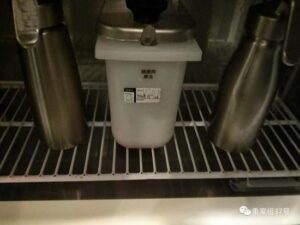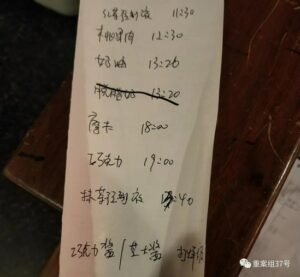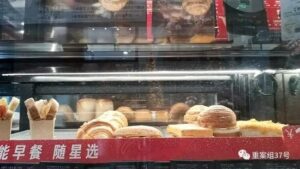Reporters from the Beijing News recently went undercover at Starbucks. Early in the morning of November 9, the reporter saw a food storage box containing a variety of pastries such as bacon and cheese egg burgers, sausage and bacon cereal sandwiches, and French-style espresso chocolate omelets, all of which had been unsealed.
A supervisor told the reporter that these were left over from the previous day, and he instructed the reporter to put them on the counter and continue selling them, “selling the ones left over from yesterday first, and then selling the new ones today.” Since they had been opened for a long time, the reporter noticed that some of the pastries were already very dry and hard, falling off at the slightest touch.
Starbucks, a world-renowned coffee brand, has more than 5,100 directly operated stores in more than 200 cities in China. Starbucks gives a promise on its official website: “Based on the highest standards in the industry, we have developed and strictly enforce the Starbucks Gold Standard for food safety.”
However, the reporter recently investigated undercover at two Starbucks stores in Wuxi and found that under the so-called “gold standard”, some stores had violated the red line of food safety: ingredients continued to be used after their expiration dates and were sold as a variety of best-selling drinks; supervisors and store employees tampered with the shelf life “by example” and some ingredients were artificially “extended” for a week; pastries that were promised not to stay overnight after opening were secretly put on the shelves the next day.
The reporter found after many days of undercover work that the above-mentioned chaos is not an occasional occurrence, driven by profit and regulatory oversight, some stores are practicing the “unspoken rules” of food safety.
Chocolate liquid and matcha liquid are still processed into drinks and sold after their expiration date
Wuxi City, Jiangsu Province, is one of the earliest areas where Starbucks is present. A map search shows that there are currently more than 80 stores in the city, mostly in commercial areas and office buildings. The official website of Starbucks says that all stores in mainland China are directly operated by the company and are not open to the public for franchising.
In late October, after three rounds of interviews, the reporter was hired to work at the Wuxi Starbucks Zhenze Road store, where the job is to make a variety of drinks, including coffee.
The store is located in the Wuxi Software Park, with a store area of nearly two hundred square meters. Many office workers in the software park are regular customers here, and in the afternoon on weekdays, the store often has long lines, and can sell 400 to 500 cups of drinks a day.
In addition to the reporter, the store has a total of nine employees, including a store manager and three duty supervisors. Although he did not have any experience, the reporter was asked to start directly after joining the store and was taught by a veteran employee. Outside of working hours, Starbucks arranged online courses for new employees to learn coffee making and rules and regulations via cell phones.
Among Starbucks’ rules and regulations, particular emphasis was placed on food safety issues. However, soon after the reporter started work, he found that the food safety rules were not in place, and ingredients were used even after they had expired.
Chocolate liquor is one of the ingredients always available in the store, and is made by mixing chocolate powder with water. On the morning of October 31, the reporter found a barrel of chocolate liquid stored in the refrigerator with a shelf life of 8:00 on October 31, and when the reporter saw it, the barrel had already passed its shelf life, but the clerk did not scrap it as required.
The reporter saw at the scene that day that the clerk had used that bucket of expired chocolate liquor more than once to make drinks for customers, including the best-selling breakfast drink cocoa vapor milk.
Around 10:00 a.m., a customer ordered a cup of cocoa vapor milk. Without hesitation, a clerk took the bucket of expired chocolate liquor out of the refrigerator and poured about 90 ml of chocolate liquor into a coffee cup and mixed it with hot milk. After this cup of cocoa vapor milk was made, the bucket of expired chocolate liquor was still not used up and was put back into the refrigerator by the clerk.
The reporter observed that this was not the only expired ingredient in the store that day, a pot of matcha liquid used to make matcha lattes had also expired. Label information shows that it expired at 8:40 a.m. on October 31, and near 2 p.m. that afternoon, the reporter saw a clerk use the pot of expired matcha liquid to make a matcha latte for a customer, after which the pot of matcha liquid was likewise put back to its original location, waiting for the next use.
On the afternoon of November 7, at the Starbucks Wuxi Zhenze Road store, the peach pulp placed in the refrigerator had expired, and the two bottles of cream next to it had also expired.
Change the label ten minutes before the expiration date, 4 kinds of expired ingredients appear in the store a day
With the investigation deep reporter found that the use of expired ingredients in the store is not a special case, but the supervisor and the store staff know the practice.
On the afternoon of November 7, the reporter saw a pot of black tea liquid placed at the bar without a shelf life label, a clerk making drinks at the bar explained to the reporter the reason, “because it has expired, the label was torn off.”
A bottle of cream shelf-life label is also missing, “cream also expired?” In the face of the reporter’s questions, the clerk gave a positive answer.
Subsequently, the reporter found a note at the bar, which recorded the expiration time of several ingredients, which stated that the expiration time of black tea liquid was 11:30, and the expiration time of cream was 13:26. This note also recorded the expiration time of peach pulp and matcha liquid, respectively, 12:30 and 13:40. The reporter then found the peach pulp and matcha liquid before the clerk had a chance to tear off their shelf-life labels, and the shelf-life information recorded on them was the same as that recorded on the note.
When the reporter saw the note, it was 5:00 p.m., which means that all four ingredients had expired.
But in the eyes of the staff, there was nothing wrong with these ingredients, and still used them to make drinks for customers as usual. On the same day, the reporter reflected the four ingredients expired to the store duty supervisor, “these ingredients are expired, should we pour out for new ones?” The supervisor on duty apparently knew about the situation and instructed the reporter to continue using the expired ingredients.
On November 7, at the Starbucks Wuxi Zhenze Road store, the clerk recorded the expiration time of some ingredients, but after the expiration, the ingredients were not scrapped on time.
In order to “cover” the use of expired ingredients, the shelf life labels of some ingredients are often arbitrarily tampered with.
Black tea liquid is a necessary ingredient for making black tea latte. At around 5 o’clock in the evening on November 2nd, the store’s black tea liquid is still half a pot, but the clerk did not empty it as required, but made a new black tea liquid poured into the pot mix. Then a clerk instructed the reporter to write a new shelf life to replace the old label, the old and new mix of black tea liquid, transformed into a new pot of black tea liquid. In this way, the original remaining black tea liquid, it will “extend” the shelf life.
The reporter observed in the store for many days found that if the old material left more, the clerk will directly tamper with the shelf life. The original shelf life of only one day of black tea liquid and matcha liquid, often to the expiration time is still a lot left, so the case of tampering with the shelf life also often happens.
At noon on November 6, the reporter saw that a pot of matcha liquid would expire at 13:49 on November 6, but ten minutes before the expiration date, a Starbucks clerk tampered with the shelf life label. The clerk looked around and found no customers around, so he picked up the pot of matcha liquid, tore off the shelf life label, and quickly affixed a new one. In this way the matcha liquid, which had already expired, could be used for one more day with impunity.
Tampering with the shelf life of ingredients is not unique to this Starbucks store. In another Starbucks store, they also handle ingredients that have expired in the same way.
On November 21, the reporter went undercover at the Starbucks Wuxi Changxing Building store and found that the cocoa chips used to make “Frappuccino” in the store had expired. The shelf-label information showed that it was opened on November 14 and expired on November 20, but instead of scrapping it, the supervisor on duty found it and tore off the shelf-label and directly replaced it with a new one. The new shelf-life label showed that its expiration time frame had been delayed by a full week.
“Fewer Frappuccinos are made in winter, and (the cocoa pieces) don’t run out in a week.” A store employee revealed that tampering with the shelf life is not only used for this one ingredient, but that mocha sauce and peach pulp also change their shelf life directly when they reach their expiration dates.
On November 6, in Starbucks Wuxi Zhenze Road store, a clerk was tampering with the shelf life information, only to see him tear off the old label and put on a new label, the original matcha liquid to expire was artificially extended the shelf life.
Cakes scrapped that day to be secretly put on the shelves for sale the next day
Not only the ingredients of the drinks, but also the pastries sold in the store were also problematic.
After working undercover at the Starbucks Wuxi Changxing Building store, this reporter found that Starbucks had 20 to 30 kinds of pastries, such as sandwiches, cakes and breads, which were not processed and made in the store, but delivered by the manufacturer. Every day when the store opened, the clerk would select samples of various types and unpack them into the container for customers to choose from. If a customer orders, the clerk will also give priority to taking samples out of the cabinet and giving them to the customer.
The opened pastries could not be stored for a long time, but some of them were left unattended even after a day.
During the investigation, the reporter asked several Starbucks stores in Wuxi, and they all promised to scrap the opened pastries on the same day if they could not be sold. The clerks at the Starbucks Changxing Building store also gave the same promise, but when the reporter went undercover, he found that the actual situation was not what they had promised.
Early in the morning of November 9, the reporter saw a food storage box with various pastries such as bacon and cheese egg burger, sausage and bacon cereal sandwich and French chocolate omelet, all of which had been unsealed. A supervisor told the reporter that these were left over from the previous day, and he instructed the reporter to put them on the counter and continue selling them, “selling the ones left over from yesterday first, and then selling the new ones today.” Since they had been opened for a long time, the reporter noticed that some of the pastries were already very dry and hard, and crumbs fell off at the slightest touch.
In the following days, the reporter found that the store would secretly put the leftover pastries on the counter almost every day.
On November 21, at the Starbucks Wuxi Changxing Building store, the pastries in the display case had been unsealed and the clerk promised that the pastries would be scrapped if they were not sold that day, but this was not the case.
Wiping garbage cans with bar towels and dealing with problematic ingredients in advance to cope with inspections
In the undercover process, the reporter found that in addition to the problem of the ingredients, Starbucks stores also have hygiene problems.
Once cleaning, the duty supervisor instructed the reporter to use the white towel from the coffee bar to wipe the trash can, which is a special towel for the bar according to Starbucks’ internal regulations, and another cleaning rag should be used to clean the trash can, “according to the regulations, a rag should be used, but it’s okay to wipe with this towel.” After wiping the trash can, the supervisor also did not ask to discard this bar towel, only asked for simple cleaning, let the reporter put the white towel back to the bar. And after this, the reporter saw other store employees continue to wipe the bar and coffee machine with this towel that had wiped the garbage can.
The reporter searched on a network complaint platform and found that complaints about Starbucks are not uncommon, with several users claiming to have drunk foreign substances at Starbucks and others complaining of abdominal pain and diarrhea after eating pastries.
Starbucks has always claimed that the company has developed and strictly enforced the Starbucks “Gold Standard” for food safety. Starbucks has displayed dozens of accolades on its website, including the “China Food Health Seven Star Award” and “Most Trusted Brand in China’s Food Industry”. In 2019, Starbucks Enterprise Management (China) Co., Ltd. successfully passed the FSSC22000 certification audit, becoming the first company in China’s food chain industry to receive this certification.
In fact, according to Starbucks’ regulations, its stores are required to conduct daily food safety self-inspections, while the management team and food safety team will conduct regular internal audits of each regional store. Each store receives at least one unannounced third-party inspection per year, and 20 percent of stores receive a second flight inspection.
A Starbucks store employee told the reporter that every half month, the store’s upper management visits the store for inspection. During the undercover period at the Starbucks Zhenze Road store, the reporter witnessed one such inspection.
And to the reporter’s surprise, seeing the inspectors come to the door, the store staff is not nervous. After careful observation, the reporter gradually understood the reason. The reporter saw that after the inspector arrived at the store, the store supervisor on duty instructed a clerk to clean up the bar in time, and let him check the shelf life of the ingredients in advance. Since there was only one inspector, the clerk was able to take advantage of his inspection of other items to dispose of expired ingredients or quickly replace them with new shelf-life labels. Sometimes, to avoid surprises, the clerk would remove the old label in advance, thus hiding the real shelf life.
Not surprisingly, the inspector ended up finding minor, unrelated problems.
Expert calls for a robust “blacklist system”
Why are expired ingredients not scrapped in a timely manner? A Starbucks employee explained to the reporter that the company wants to assess the turnover and profitability of the stores, and if the cost of ingredients is too high, these data will not look good, “if the ingredients do not go out to scrap, even if the cost of the store, these things are the store to spend money.”
He admits that despite Starbucks’ strict rules, there are still problems with enforcement. Earlier old employees have developed bad habits, “master with the apprentice, basically taught out of the people, generation after generation, for the regulations are indifferent attitude.”
In this regard, Chen Yinjiang, deputy secretary-general of the Consumer Rights Protection Law Research Society of the Chinese Law Society, said that Starbucks, as a well-known brand, should have very mature management experience, and the emergence of such a low-level problem shows that there are large loopholes in management.
“In reality, there are always some businessmen who are deterred by the pressure of profit or driven by interests, and are willing to take the risk of breaking the law and compressing costs through methods that harm consumers’ rights and interests.” In Chen Yinjiang’s view, it is understandable that companies save costs, but food safety is about the lives and health of the people, and must adhere to the red line.
Since this year, a number of well-known restaurant brands have been exposed to food safety problems one after another. Chen Yinjiang suggested that the regulatory authorities to strengthen the daily supervision at the same time, but also to improve food safety blacklist system, “set up access and exit mechanism, enterprises serious violations of food safety law to be included in the blacklist, individuals to make a bad violation of the law should also be included in the blacklist, joint disciplinary may have a better effect.” Source



